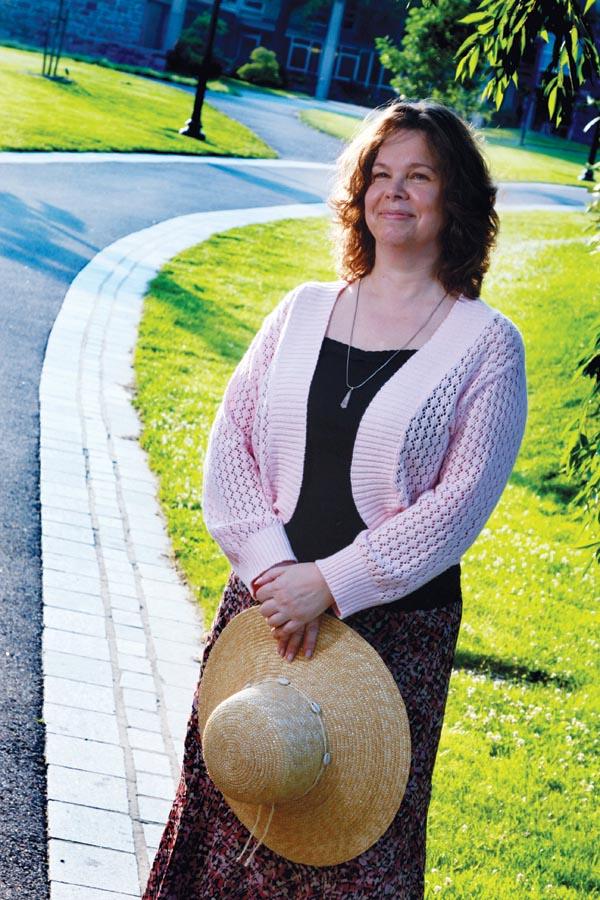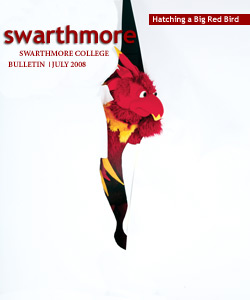What’s Taken for Granted

After 27 years on the faculty, including 10 years as associate dean, Joy Charlton has put it all together as director of the Lang Center for Civic and Social Responsibility.
“As a sociologist, I do a lot of interviews,” says Joy Charlton at the beginning of our conversation, “but they’re always confidential. The thought of being on the other side of the tape recorder and saying things that will become public is a little scary.”
Before taking over last year as executive director of the Lang Center for Civic and Social Responsibility, Charlton spent 10 years as associate dean for academic affairs, running the academic support systems of the College and counseling students about how to succeed in their academic work. From early in her time at Swarthmore, she has been interested in service learning, or, more broadly, community-based learning—teaching or research that involves direct engagement with and positive contributions to organizations or communities. Throughout her stint in the Dean’s Office, she continued to teach courses that sent students to workplaces, voluntary associations, and neighborhoods to learn.
Charlton joined the faculty in 1981, bringing interests in organizational sociology, the workplace, gender roles, religion, urban studies, and research methods. Her dissertation at Northwestern University was on secretaries and bosses. She has since studied occupations as varied as clergywomen and nuclear security guards in the Air Force. She has also served as book review editor for the Journal for the Scientific Study of Religion.
Before this interview, I had a hard time finding out much about you.
I’m a little shy about being a public person—although I’ve come a long way in being a public person for a cause or for work or for someone else. Being a public person for myself I find much harder.
Is the Lang Center job one that you could have designed for yourself?
Absolutely. It brings together all my experiences—and my interest in doing good in the world. When I started teaching at Swarthmore, I wanted to go to [then Provost] Jim England and say, “OK, just make me Ms. Service Learning at the College; that will be my contribution to Swarthmore.” But I was untenured, and the advice was to do traditional research and publish in traditional ways and teach in traditional ways—and wait until later. Now that’s changed. Interest in community-based learning and social action is booming—and so is the support for it.
What do you mean by “service learning?”
It’s contributing positively to an organization or community while participating there in order to learn. Students can learn by observation and practice outside the classroom while being supported inside the classroom by research and theory. Students learn in a kind of visceral way. They think independently on the basis of their own discoveries and develop analytical skills in ways they just can’t otherwise—all while doing good for others. It’s a terrific combination.
Why did you go to work in the Dean’s Office?
I had gotten to that point in my career when I was asking what was missing for me. I came up through the ranks in the traditional way, getting tenure, becoming a full professor, serving as department chair for five years. But academia is a closed loop for the most part. We make our careers by talking mostly to each other. That hasn’t always felt right or enough for me.
But isn’t that different at Swarthmore, where the emphasis is on teaching?
I loved teaching, and I still do. I especially love the connection I make with students when I teach. But I felt like it wasn’t serving….
Serving what?
I was raised a preacher’s daughter in the small-town South, the daughter of a liberal white minister in the middle of the civil rights era. My father was involved in activist work that got him in a whole lot of trouble in those days. And he had this thing called the Love Fund—money that he raised from his congregations to use for people in need. I would go with him on visits to peoples’ homes, and we would find ways to be of service, both personally by being with them in times of need but also to help them materially. In academia, I was missing the service component.
Were you able to remain a sociologist while in the Dean’s Office?
I’m a sociologist because I find it endlessly interesting trying to understand how people work in groups. It was so clear, growing up in small-town America, that social life was really powerful—and no one could explain how. As a dean, in addition to helping others, I got to be part of an administration and found it endlessly interesting to observe how people make a college work.
Isn’t that a little like watching the making of sausage?
No, actually. It increased my admiration incredibly. I would not have stayed in the administration for as long as I did, had the senior administration here not been so good. When I listen to colleagues talk about their own schools, I seldom hear about the level of trust we have here. These have been golden years administratively.
Do you worry about losing that as Al Bloom departs?
There are things we take for granted now that we don’t realize we take for granted—assumptions about how things work and what gets communicated. Any sociologist will tell you that what’s most important in social life is what’s taken for granted. You aren’t even aware of it; it’s like breathing air. Whoever becomes president, he or she is not going to be a clone of Al. There will be transition time, there will be change, and change can be hard.
 Email This Page
Email This Page